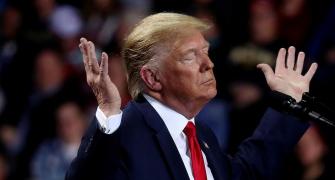The US business lobby, which was monitoring the trust vote on a minute-by-minute basis, was ecstatic over the outcome when the Indian Parliament voted to support Prime Minister Manmohan Singh's decision to move forward with the US-India civilian nuclear agreement, with Ron Somers, president of the US-India Business Council, describing it as "an historic victory for India and the globe."
Consequently, the USIBC pledged to energise the US Chamber of Commerce-sponsored Coalition for Partnership with India and also expressed elation over reports that the board of governors of the International Atomic Energy Agency would consider approving its safeguards agreement with India on July 25, "setting the stage for consideration by the 45-nation Nuclear Suppliers Group to waive conditions relative to India, ending India's nuclear isolation, and enabling civilian nuclear trade in technology and fuel by the entire 45-nation body."
Somers predicted that "India's responsible record in developing its existing civilian nuclear power programme will bring much-needed talent and innovation to the 'nuclear renaissance' underway, necessary to stem global warming."
The USIBC, acknowledging that July 25 would be the next 'key date' in this process, said, it would be waiting for the IAEA's clearance of the safeguards agreement "to end India's nuclear isolation."
Somers acknowledged that once this vote by the IAEA is in, the NSG must reach consensus to exempt India from certain conditions enabling civilian nuclear trade with India before the US Congress can ratify the so-called US-India 123 Agreement and hence "time is tight."
"The US Congressional calendar is jam-packed between now and the US presidential election," in November, he said, but said the USIBC was "encouraged by the recent statements made by Senate Foreign Relations Committee Chairman Senator Joe Biden, who says he will find time to press for ratification of the 123 Agreement so long as India is able to complete its steps."
Somers was apparently referring to a recent interview by Biden with rediff.com when he said that even though the time "is very, very, tight," it was "possible" for the deal to be ratified by Congress, and that "I am going to push like the devil," and that "if they (India) gets their end done. I am an optimist. I am not going to say it (the Congressional clock) has run out."
"The USIBC and the Coalition for Partnership with India will be front and center in this debate to ensure Congressional passage," Somers said.
He pointed out that India has a total installed capacity of 135,000 megawatts, mostly comprised of thermal power, which is carbon-emitting, causing global warming, and that India's Nuclear Power Corporation has a goal of augmenting this capacity by as much as 30,000 megawatts to 60,000 megawatts over the next 20 years, "requiring investments in excess of $100 billion."
Somers said that "US companies look forward to cooperating with Indian companies to achieve this important energy security infrastructure build-out," and noted that of the world's existing nuclear powers reactors, which number 400, India's reactors total only 22, while the US, which has the most number of nuclear reactors in the world has over a 100.
The USIBC formed in 1975 under the aegis of the US Chamber of Commerce is the premier business advocacy organisation representing over 280 of the largest American companies investing in India, along with about two dozen of India's largest global companies.
On June 12, when the USIBC celebrated its 33rd anniversary, its new chairman, Indra Nooyi, chairman and CEO of PepsiCo, and the first ever woman to head the organisation, spoke of how imperative it was for this deal to be consummated for both the benefit of India's development and energy requirements as well as for the US in its efforts to forge a strategic partnership with India.







